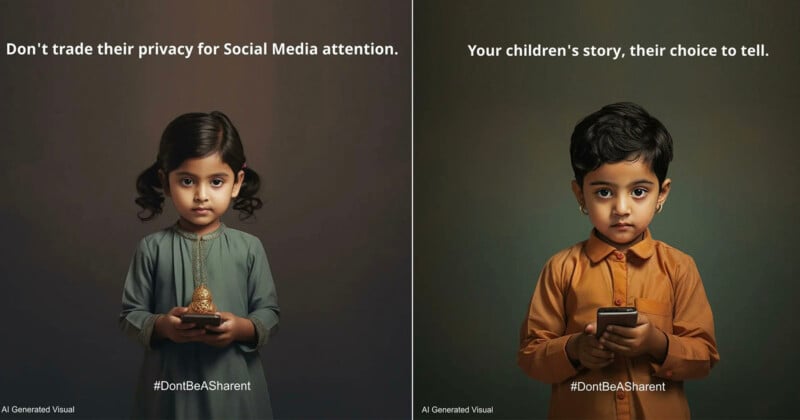‘Sharenting’ Campaign Warns Parents About Posting a Child’s Photo Online

A police force in India has made an AI-generated campaign advising parents not to be a “sharent” — warning them not to post photos of their children online.
The campaign by Assam police reads: “Likes fade, but the digital scars remain. Shield your child from the perils of sharenting. Be mindful of what you share about your child on social media.”
It is accompanied by a series of images of children generated by artificial intelligence (AI), some are holding trophies and mobile phones.
“Children are not social media trophies,” reads one of the captions. “Snapshots of innocence, stolen by the internet,” says another.
Likes fade, but the digital scars remain.
Shield your child from the perils of Sharenting.
Be mindful of what you share about your child on Social Media. #DontBeASharent pic.twitter.com/Z8oilz8PFR
— Assam Police (@assampolice) July 15, 2023
Other pictures read: “Don’t trade their privacy for social media attention” and “Your children’s story, their choice to tell.”
Kids’ Privacy on Social Media
It comes after Meta CEO Mark Zuckerberg shared a family portrait to his Instagram account with two of his kids’ faces obscured with an emoji. It begs the question, if Zuck hides his children’s faces, shouldn’t everyone?
Speaking on the PetaPixel podcast about the issue, Chris Niccolls says: “There are so many levels to how you’re showing your kids online and why you’re doing it. Why is a big deal.
“One truth to really get out there is, the instant you take a picture and put it online…there’s nothing you can really do to prevent whatever you’re trying to prevent.”
Another ad campaign from Germany shows a deepfaked girl warning her parents not to share photos and videos of her online.
The advertising campaign, created by telecommunications company Deutsche Telekom, has gone viral for its dark warning of the potentially devastating consequences that parents posting photos of their children online can have and just how easily a child’s image can be manipulated by AI.
The Average Five-Year-Old Has 1,500 Photos Online
Adweek reports that some studies have estimated that by 2030, nearly two-thirds of identity fraud cases affecting a young generation will have resulted from “sharenting.”
Research also shows that an average five-year-old child has already had about 1,500 pictures uploaded online without their consent by their parents.
Image credits: Courtesy of Assam Police.